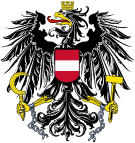1945 Austrian legislative election
| This article is part of a series on the |
| Politics of Austria |
|---|
 |
The elections to the Austrian National Council held in fall of 1945 were the first after World War II. The elections were held according to the Austrian election law of 1929, with all citizens at least 21 years old eligible to vote,[1] however former Nazis were banned from voting, official sources putting their numbers at around 200,000.[2] The Communist Party of Austria only gained four seats, which some blamed on the conduct of the Red Army in the Soviet occupied zone of Austria.[3] This was highly embarrassing for the Communists, who had assured the Soviets that they could win as much as 30 percent of the vote. This proved to be the beginning of a long decline for the Communists, though they would manage to stay in the chamber until May 1959.
The Austrian People's Party led by Leopold Figl (1902–1965) won a sweeping victory, taking just under half of the vote and an absolute majority of seats in the National Council. Despite winning a majority, Figl opted to continue the three-party grand coalition with the Socialists and Communists. However, the Communists, who had been equally represented in the Renner government since the end of the war, only received one Cabinet post.[4] On 20 December 1945 the Federal Assembly of Austria unanimously elected incumbent Chancellor Karl Renner of the Socialist Party as President of Austria, who swore in Leopold Figl as new Chancellor on the same day.[5][6]
Results
Template:Austrian legislative election, 1945
References
- ^ Herald Journal - 24 November 1945 (Google News), retrieved 19 May 2010
- ^ Ottawa Citizen - 23 November 1945 (Google News), retrieved 19 May 2010
- ^ The Sydney Morning Herald - 27 November 1945 (Google News), retrieved 19 May 2010
- ^ Federal Chancellery of Austria - Austrian Chancellors and Cabinets since 1945, retrieved 19 May 2010
- ^ President of Austria - Dr. Karl Renner, retrieved 19 May 2010
- ^ Herald Journal - 21 December 1945 (Google News), retrieved 19 May 2010


